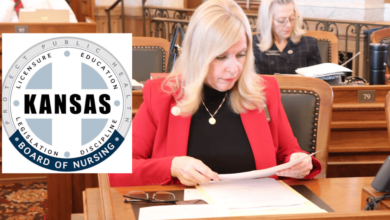First specialist social care nursing qualification launched

Northumbria University has launched the UK’s first new specialist practice qualification (SPQ) in community adult social care nursing.
Nurse leaders have praised the move as a “significant step forward” for recognising specialist nursing practice in social care settings.
“I hope that Northumbria’s success in developing this programme will act as a catalyst for others”
Deborah Sturdy
The new SPQ qualification, which has been approved by the Nursing and Midwifery Council (NMC), aims to support more nurses to choose social care nursing as a career.
The qualification will be available to registered nurses working in, or working closely with teams and patients in, a social care setting like residential and nursing care homes, care at home and hospices.
Northumbria University, the first higher education provider in the UK to provide this course, said the programme had been flexibly designed to ensure that it is accessible to as many nurses as possible.
The postgraduate diploma will be provided as either an apprenticeship or traditional university course to registered nurses, on a full-time (one year) or part-time (two years) basis.
Like Northumbria University’s other SPQ programmes, the community adult social care nursing course will have a 60/40 split between clinical practice and protected learning time respectively.
Professor Alison Machin, head of department for nursing, midwifery and health at the university, said: “Adult social care nurses are often responsible for providing care for people with multi-morbidities, chronic conditions, and are responsible for looking after for people with some of the most complex clinical, emotional and care needs.
“This new course goes a long way to recognising and raising the profile of the level of skill required to fulfil the role.”
Professor Machin noted that the role of adult social care nurses was “only going to grow” as universities strive to meet the goals set out by the government and NHS England.
“By giving these nurses opportunities for more structured career progression, we should be able to better attract and retain staff into this specialist area,” she added.
It comes as, earlier this year, the government embarked on a campaign to boost the domestic pipeline into adult social care nursing.
As part of this, the Department of Health and Social Care unveiled a package of measures, backed by £75m funding, which would recruit new talent to the sector, which included investment in adult social care nursing apprenticeships.
Separately, higher education institutions have recently been encouraged to expand placement opportunities in social care to encourage more nurses into the field.
Professor Deborah Sturdy, chief nurse for adult social care in England, said: “I am delighted to see the first course for social care nurses approved and recognition of a specialist practice.
“This is a significant step forward for the specialism and for the first time creates a platform for sector nurses to develop their practice.
“I hope that Northumbria’s success in developing this programme will act as a catalyst for others.”
The launch of Northumbria University’s course follows the update to the NMC’s post-registration standards for community and public health nurses in recent years.
The NMC revamped its standards of proficiency for community nursing specialist practice in 2022 to acknowledge the fact that community nurses now give care in a variety of places to diverse populations.
Amid concerns that these standards were too generic, the Queen’s Nursing Institute then developed its own ‘field-specific’ standards for specialisms within community nursing, which were published last year.
The QNI has since published standards for the following specialisms: adult social care nursing, community children’s nursing, community mental health nursing, district nursing, general practice nursing, inclusion health nursing, health and justice nursing, community learning disability nursing and palliative and end-of-life care nursing.







